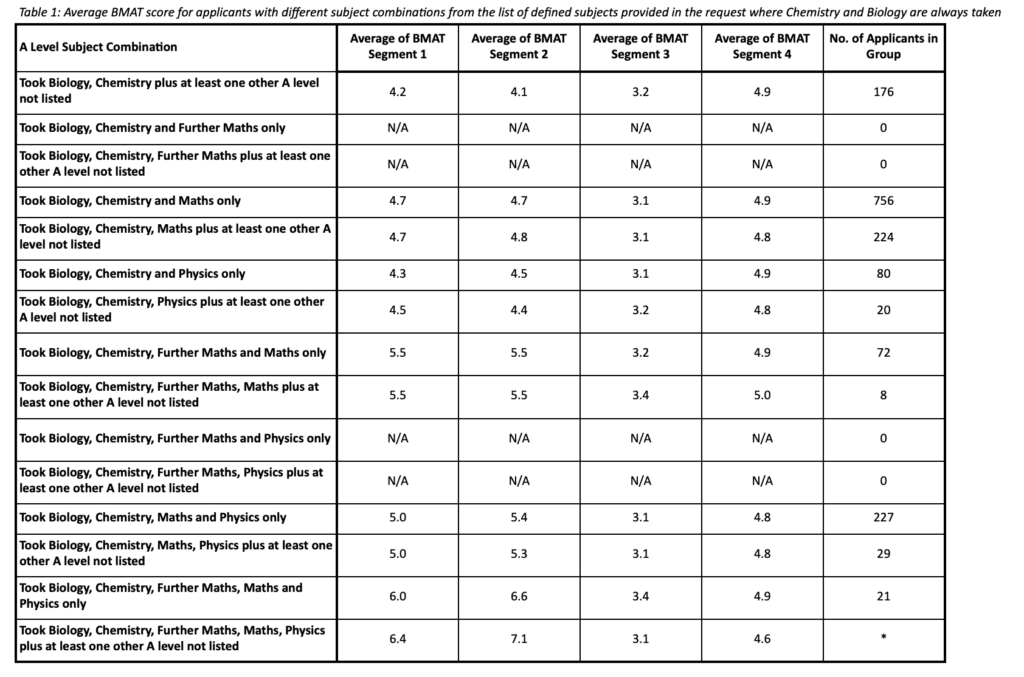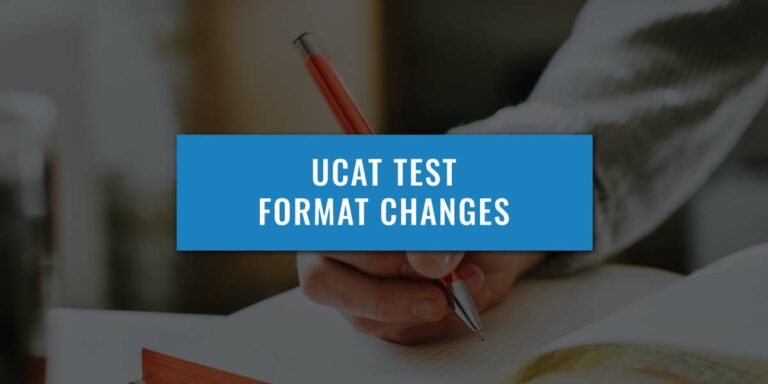As of 2024, the BMAT will no longer operate for Medicine applicants. Applicants for all UK medical schools will be required to sit the University Clinical Aptitude Test (UCAT) for 2025 Entry. Find out more in our BMAT/UCAT 2025 Guide.
A lot of people have questions about the BMAT, in particular the science section, regarding what you need to know and study.
Many people have questions about the BMAT, particularly the science section, regarding what you need to know and study. Section 2 of the BMAT is a test of your scientific and mathematical knowledge, with success hinging on your understanding of the subject rather than general thinking skills. Therefore, you’re going to need to be well-versed in the theory behind the four subjects covered.
One of these topics is Physics, the topic that feels the furthest away from the skills and knowledge required to succeed in medicine. Where Chemistry and Biology knowledge are both incredibly important for studying at medical school, Physics isn’t applied anywhere near as much. Therefore, your understanding of this subject may be lacking compared to the others.
One question that is often asked is whether you need to study Physics at A-Levels in order to stand a good chance at being successful. Many medicine applicants will already be studying A-Level Chemistry and Biology, so you may prefer to move away from science for your third subject to study a different type of subject. But will studying Physics benefit your application and improve your chances of success? Let’s find out:
(Be aware that the majority of what is discussed here can generally be applied to any A-Level equivalents as well).
How Does A-Level Physics affect your BMAT Results?
The first thing we should do when answering a question like this is to explore any available data that may provide evidence for or against the benefits of taking A-Level Physics. Data that provides context to applicant A-Levels is not currently that common, but we can start with data provided by Imperial College London:
This is a lot of data to look through and generally does not provide a clear picture in either direction. We can see that applicants who took more scientific and mathematical A-Levels scored better overall, with the highest average scores for Sections 1 and 2 coming from those who studied all listed subjects, although this is a very uncommon occurrence.
However, this data is fairly old at this point an may not be representative of the current trends in BMAT results. Plus, additional data is available that presents A-Level Physics in a more positive light:
Data from the BMAT providers shows that those who took A-Level Physics versus those that did not score, on average, 0.6 points higher in Section 2. At first, this may seem like a lot, but a similar pattern is seen across all three sciences and Maths, so this is unsurprising.
Due to the age and unreliability of the data made available by official sources, it is difficult to use it as a clear indicator to make your decision. Therefore, this issue becomes more of a personal choice.
Be ready for the UCAT now that the BMAT has been removed.
With the BMAT being removed, it is more important than ever to be prepared for the UCAT. At UniAdmissions, we are experts at boosting your UCAT score and maximising your chances of gaining a place to study Medicine.
Discover our UCAT Tuition Programme by clicking the button below to enrol and triple your chances of success.
Does A-Level Physics help with the BMAT?
So as the data is fairly inconclusive we now have to look at less quantitive reasons as to why you should or shouldn’t take A-Level Physics to benefit your BMAT performance.
Firstly, let’s understand the BMAT Section 2 questions a bit more. The syllabus for science questions inthe BMAT doesn’t come from any specific examining body or level of education, but they would be most comparable to GCSE-level content, with elements of A-Levels included.
All three sciences are mandatory for students in most cases, so you will have most likely studied Physics at a GCSE level or equivalent. However, there’s no guarantee that you will have studied it all in your specific course so it’s always important to study the BMAT Content Specification yourself.
With this information, we can make the assumption that having an expanded knowledge of Physics may be helpful but will ultimately not give you as much of an advantage over someone who stopped studying Physics after GCSEs. While some questions may be more advanced than what you studied at school, the number of questions you will potentially struggle with will be negligible, with the Physics portion taking up less than 10% of the BMAT overall.
Should I avoid Physics if I am applying for medicine?
We’ve been somewhat negative about A-Level Physics so far, but this has only been in the context of the BMAT and the potential benefits it may have on results. If Physics is a field that you are genuinely interested in then continuing it in your education is definitely a good idea.
All Medicine applicants are going to have to take either Chemistry or Biology, with some medical schools requiring applicants to take both. Many others will require you to take Chemistry or Biology, plus one other science or Maths. In cases like these, studying Physics will be acceptable.
While it’s debatable in some cases, it is typically agreed upon that Physics is the least relevant to Medicine when compared to Biology and Chemistry. However, that doesn’t make it pointless to study, as there is plenty of actionable knowledge that will help you in your medical studies. Not to mention the various career paths in the industry that require Physics knowledge, such as Medical Engineering.
To bring the discussion back around to the BMAT however, studying Physics at A-Level isn’t going to be what gets you the highest score and guarantees your success. We’ve seen multiple reasons why you shouldn’t choose Physics solely for the sake of the BMAT, but the most important reason is your own personal investment in the subject. If you aren’t interested in studying Physics or have any desire to go into a field that relates to it, then there’s no need to choose it at A-Levels.
All medicine applicants will already be studying at least one science (in most cases two), so adding Physics into your studies could increase your chances of losing motivation in your studies generally. Physics is in no way an easy subject to take on, so you really do need to have a firm interest in it to be able to successfully navigate the various challenges it poses.
How Else can i prepare for BMAT Physics?
Whether or not you are studying Physics at A-Levels, if you are concerned about the BMAT the best thing you can do is revise and practice outside of your regular studies. If you don’t study Physics, it would be a good idea to work through a BMAT-specific textbook in order to revise the topics that will actually come up in the test. While most of this knowledge will already be familiar to those who are studying Physics, it would also be a good idea to do a bit of BMAT-focused revision too. And of course, practice questions and mock exams are a must!
If you’re looking for resources available online, there are a couple of good options available for free. First of all are the Past Papers, which you can download free of charge alongside the answer keys. These are all official past papers sat by previous year’s applicants, so you know that the style and difficulty of the questions will be representative of what you will be facing.
As well as BMAT papers, you can also download past papers from other exams with similar question types. While these won’t be as representative of what you’ll be facing, they still allow you to test your knowledge in an exam format. For Physics specifically, you can try out papers from the PAT, ENGAA and NSAA.
The second option is to look out for BMAT question banks that are free to use or free to start. Of course, if you want a more complete practice resource you may need to pay a fee, but the free options are certainly a good starting point.
If you are willing to invest a bit more time and money into your preparation, then a BMAT Preparation Programme may be for you. These can range in price and content, with simpler courses offering tutorials and question banks while more advanced options provide one-to-one tuition and live intensive courses.
Of course, these options aren’t necessary for all applicants, but those who are less confident in their abilities may find a lot of benefits to seeking extra support.
Conclusion
To provide a clear-cut answer to the question asked in this article – no, you do not need to study Physics to do well in the BMAT. Plenty of applicants are able to perform well in the BMAT and successfully gain offers without studying all three sciences, so this should be no different for you.
As we’ve said, this doesn’t mean you shouldn’t study Physics as it’s still a very valuable subject with lots of topics that will help you in your medical education and career. But do not feel that you need to dedicate one of your A-Level slots to it just because it appears in the BMAT – the most important thing is that you study the subjects that you are most passionate about.
If you are feeling concerned about more than one subject in Section 2 or just any other subject in general, be sure to check out our free guides on our website. If you would like to learn about even more effective BMAT support, discover our BMAT Tuition Programme today.
Create the ultimate UCAT preparation plan with the help of UniAdmissions.
Get a head start on your UCAT preparation and enrol on our UCAT Tuition Programme, which offers you everything you need to prepare for the UCAT and get a winning score.
Discover our UCAT Tuition Programme by clicking the button below to enrol and triple your chances of success.










